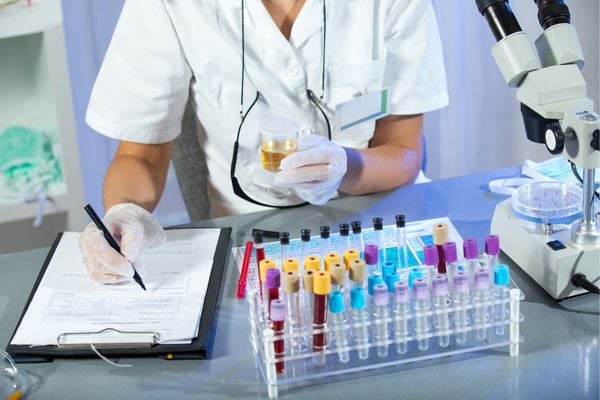October 13, 2023
Esta podría ser una pregunta incómoda, pero ¿se ha hecho un análisis de orina últimamente? El análisis de orina proporciona a los profesionales sanitarios una imagen más clara de su función renal y su salud general. Aquí le mostramos cómo.
¿Qué es un análisis de orina?
No es especialmente divertido orinar en un frasco en el consultorio del médico, pero lo que los proveedores de cuidado de la salud pueden encontrar en tan solo dos cucharadas de orina hace que valga la pena: signos de afecciones graves como enfermedad renal, diabetes y enfermedad hepática.
Aunque esto puede parecer mágico, los profesionales de atención médica utilizan una combinación de lo que pueden ver a simple vista, un microscopio y una tira de plástico con sustancias químicas llamada tira reactiva para determinar si algo puede estar mal con su salud.
- Examen visual: los profesionales de atención médica observan el color y la claridad para detectar signos de enfermedad renal o infección.
- Microscópico: un microscopio ayuda a los profesionales de atención médica a encontrar cosas que no pertenecen, como glóbulos rojos o blancos, bacterias o cristales que podrían convertirse en cálculos renales.
- Análisis con tira reactiva: esta herramienta útil determina la acidez (pH) y busca signos de diabetes, problemas hepáticos, infecciones o problemas renales.
Orina de color rojo o marrón oscuro
Si nota que la orina es de color rojo o marrón oscuro, no se preocupe, pero hágala controlar por un profesional. Aunque ciertos medicamentos o alimentos podrían causar este color, también podría ser sangre. La sangre en la orina, llamada hematuria, se produce cuando los filtros de los riñones u otra parte de las vías urinarias no funcionan correctamente o están dañados.
Existen dos tipos de hematuria.
- Hematuria microscópica: no habrá signos visibles de sangre a simple vista, por lo que los análisis de orina frecuentes son tan importantes.
- Hematuria macroscópica: la orina tiene un color rojo o el color del té o la cola.
¿Buscas más información?
Únete a nuestra comunidad
Mantente conectado y accede a recursos adicionales relacionados con la enfermedad renal.
Orina espumosa o pegajosa
¿Ve burbujas espumosas o pegajosas cuando usa el baño? Podría ser simplemente por la fuerza de la orina golpeando el agua en la taza del inodoro, especialmente si va de mucha urgencia.
Las burbujas, especialmente las que requieren tirar varias veces la cadena del inodoro, pueden ser un signo de proteínas en la orina o albuminuria (proteinuria). Una de las tareas más importantes del riñón es eliminar los productos de desecho y el agua adicional de la sangre. Si los riñones están dañados, la proteína, que pertenece a la sangre, también puede filtrarse.
Por desgracia, las proteínas no siempre hacen que la orina sea espumosa o espesa, por lo que un análisis de orina es la única forma de saber si está ahí.
Tener proteínas en la orina no significa automáticamente que tenga daño renal. Su profesional sanitario le hará pruebas durante los siguientes tres meses. Si cada resultado es positivo para proteínas, puede tener enfermedad renal. También es posible que le hagan análisis de sangre para determinar la eGFR o una biopsia renal para detectar una lesión renal.
Orina con olor
Si nota que su orina huele más de lo habitual, no se alarme demasiado. La deshidratación o ciertos alimentos como los espárragos o los repollitos de Bruselas pueden causar mal olor en la orina. Sin embargo, siempre es mejor prevenir que lamentar, así que informe a su profesional de atención médica. Ellos determinarán si usted necesita un análisis de orina.
Cuándo hacerse un análisis de orina
Incluso si no tiene ningún síntoma, los análisis de orina frecuentes son una excelente manera de llevar un registro de su salud general. Tómelo de George, un receptor de trasplante de riñón sin signos de enfermedad renal hasta que estos le fallaron.
“A menos que estés haciendo un chequeo anual”, dijo George, “no sabes qué está pasando dentro de tu cuerpo. El riñón me dejó de funcionar porque tenía glomerulonefritis… que es algo que generalmente pasa desapercibido a menos que te hagas un chequeo”.
No espere a acudir a un profesional sanitario si observa algo extraño en la orina. Coby, receptor de un trasplante de riñón, vio sangre en la orina durante años, pero evitó ir a los médicos hasta que presentó síntomas de insuficiencia renal.
“Orinaba sangre y tenía acné por todas las piernas. Al final de la universidad, empecé a notar una gran disminución en el rendimiento deportivo y me despertaba con las sábanas empapadas. Los tobillos estaban hinchados, pero mis amigos dijeron que solo me estaba haciendo viejo”, dijo Coby. Años después, “me hicieron análisis de sangre y mi nivel de creatinina estaba por las nubes. Todos mis números básicos de riñones estaban mal”.
Si Coby se hubiera hecho la prueba antes, es posible que hubiera podido controlar su enfermedad renal para mantener la función renal durante más tiempo.
¿Tiene riesgo de padecer enfermedad renal? Responda en un minuto este cuestionario para averiguarlo.













